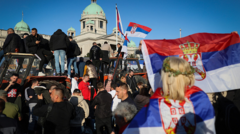Supporters of Serbian President Aleksandar Vucic rallied in Belgrade, with attendance reported at around 55,000, a stark contrast to previous protests. The gathering, branded the start of a "Movement for the People and the State," aimed to counter months of upheaval triggered by a fatal infrastructure collapse. Vucic's speech targeted both dissenting voices and alleged foreign interference in Serbia's sovereignty, amid rising public scrutiny and accusations of corruption.
**Pro-Government Rally in Serbia Sees Tens of Thousands Amidst Ongoing Unrest**

**Pro-Government Rally in Serbia Sees Tens of Thousands Amidst Ongoing Unrest**
Tens of thousands gather in Belgrade to support President Vucic, as recent protests highlight public dissatisfaction with his administration.
In the shadow of recent unrest, tens of thousands of Serbian citizens converged in Belgrade to show their support for President Aleksandar Vucic during a pro-government rally. According to monitoring organizations, approximately 55,000 attendees gathered outside the National Assembly. Despite this sizable turnout, the numbers were notably lower than the powerful anti-government protests held last month. Some rally participants reportedly traveled from neighboring countries, reflecting a pointed display of support for the President amidst ongoing public dissatisfaction.
The surge of protests began last November after a tragedy at a railway station in Novi Sad claimed 15 lives, instigating widespread public discontent directed at the government of Vucic’s Progressive Party. Many citizens voiced concerns over alleged corruption and negligence surrounding infrastructure projects, attributing the station collapse to long-standing issues within the ruling party’s governance.
Promoting the event as the inauguration of a new initiative to "save" Serbia, Vucic emphasized his commitment to restoring order while claiming that opposition protests have incited unrest. He labeled these dissenting actions as threats to national stability and inferred that they were fueled by foreign intelligence operatives eager to undermine Serbia's sovereignty. While Vucic did not specify the foreign entities he alluded to, he described the national broadcaster RTS as complicit in efforts to catalyze a "colour revolution" against his administration.
The uproar following the Novi Sad incident included fervent accusations of corruption. Protesters, rallying behind the motto "corruption kills," highlighted the opaque governmental processes that they believe have favored wealthy contractors at the expense of public safety. In light of these critiques, demonstrators have maintained pressure on the government with multiple protests, culminating in a historic event last month where independent estimates suggested up to 325,000 people gathered to express their grievances—a significant marker in Serbia's political landscape.
As the political climate remains tense, the Vucic administration continues to deny allegations of deploying aggressive crowd control measures, including the use of a 'sonic cannon' at protests. With rising calls for accountability in government, Serbia finds itself in a battle between pro-government sentiment and a populous increasingly intolerant of perceived injustices.



















